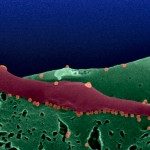Link to Pubmed [PMID] – 21712796
J Vis Exp 2011;(52)
RNA viruses use RNA dependent RNA polymerases to replicate their genomes. The intrinsically high error rate of these enzymes is a large contributor to the generation of extreme population diversity that facilitates virus adaptation and evolution. Increasing evidence shows that the intrinsic error rates, and the resulting mutation frequencies, of RNA viruses can be modulated by subtle amino acid changes to the viral polymerase. Although biochemical assays exist for some viral RNA polymerases that permit quantitative measure of incorporation fidelity, here we describe a simple method of measuring mutation frequencies of RNA viruses that has proven to be as accurate as biochemical approaches in identifying fidelity altering mutations. The approach uses conventional virological and sequencing techniques that can be performed in most biology laboratories. Based on our experience with a number of different viruses, we have identified the key steps that must be optimized to increase the likelihood of isolating fidelity variants and generating data of statistical significance. The isolation and characterization of fidelity altering mutations can provide new insights into polymerase structure and function(1-3). Furthermore, these fidelity variants can be useful tools in characterizing mechanisms of virus adaptation and evolution(4-7).


